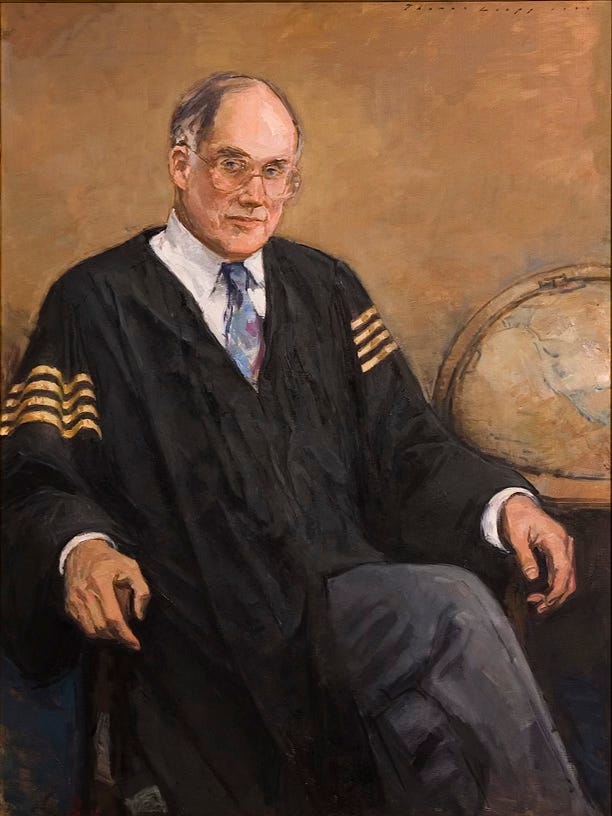This Day in Legal History: William Rehnquist Born
On October 1, 1924, William Hubbs Rehnquist, the 16th Chief Justice of the United States, was born in Milwaukee, Wisconsin. Appointed to the Supreme Court in 1972 by President Nixon, Rehnquist became a polarizing figure, known for his staunch conservatism and originalist approach to the Constitution. His judicial philosophy often focused on restricting federal authority and bolstering states' rights, positions that critics argued rolled back civil rights protections and hindered federal progress on social justice issues.
In 1986, President Reagan elevated Rehnquist to Chief Justice, a decision that pushed the Court further right. At his swearing-in, Reagan hailed him as a defender of constitutional values, but opponents viewed his appointment as the solidification of an increasingly reactionary judiciary. The same ceremony saw Antonin Scalia, another conservative, sworn in, signaling a shift that would influence rulings on affirmative action, voting rights, and church-state separation.
Rehnquist's tenure included controversial rulings, notably his role in Bush v. Gore (2000), which critics argue undermined democratic principles by halting the Florida recount and effectively deciding a presidential election. His leadership on the Court was also marked by decisions that curtailed congressional power under the Commerce Clause, weakening federal authority in areas like civil rights and environmental regulation. While his supporters celebrated him as a guardian of limited government, his legacy remains contentious, with lasting impacts on the Court's direction and the balance between federal and state power.
A fun Rehnquist fact is that you’ll see in any official pictures or portraits of him as Chief Justice, his sleeves have yellow arm bands. Rehnquist insisted on adding four gold stripes on each sleeve to distinguish himself from the associate justices. He was inspired by the costume of the Lord Chancellor in a production of the Gilbert and Sullivan opera Iolanthe. Rehnquist’s addition of the stripes was an unusual departure from the traditional plain black robes worn by justices, and it became a symbol of his unique approach to the role.
New York Mayor Eric Adams has brought on three high-profile litigators as he faces federal criminal charges. William Burck, a former George W. Bush White House lawyer and current Fox Corp. board member, is one of the lawyers advising Adams. Burck, known for representing figures like Stephen Bannon and Don McGahn, joins Quinn Emanuel Urquhart & Sullivan partners John Bash III and Avi Perry on Adams’ defense team.
Alex Spiro, a partner at Quinn Emanuel with experience defending high-profile clients like Elon Musk, is leading the defense. The charges involve allegations that Adams accepted lavish travel perks and had improper ties to the Turkish government. Adams has denied wrongdoing and vowed to continue as mayor while fighting the charges. His legal team has requested the case’s dismissal.
Meanwhile, a legal defense fund for Adams has paid over $877,000 to law firm WilmerHale, and several staffers have left his administration amid ongoing investigations. Additionally, Theresa Hassler was recently appointed general counsel for the Mayor's Fund to Advance New York City, a nonprofit under scrutiny for its fundraising practices.
Ex-Bannon Lawyer With Fox News Ties Joins NYC Mayor Defense Team
Today, on October 1, 2024, a Georgia judge will hear a challenge from Democrats against new election rules introduced by the Republican-led Georgia Election Board. These rules, approved in August, allow county officials to investigate discrepancies in vote counts and scrutinize election-related documents before certifying results. Democrats argue that these changes, which came just before the November 5 election, are designed to erode trust in the process and could delay certification.
The rules were backed by three board members who are allies of Donald Trump, who continues to challenge his 2020 loss in Georgia. Trump has praised these board members for their efforts to increase election security, though critics, including Republican Secretary of State Brad Raffensperger, say the changes could undermine voter confidence and strain election workers.
A separate lawsuit was also filed to block a new requirement for a hand count of ballots. Democrats contend that these rules create confusion and provide too much leeway for local officials to investigate alleged fraud, potentially delaying results. The trial in Fulton County Superior Court is part of a broader national focus on battleground states like Georgia, where both Republicans and Democrats are intensely focused ahead of the upcoming presidential election.
Challenge by US Democrats to Georgia election rules goes to trial | Reuters
As artificial intelligence (AI) continues to transform industries, more U.S. law firms are appointing executives to lead AI initiatives. Akin Gump Strauss Hauer & Feld and McDermott Will & Emery both announced new AI leadership hires, with Akin appointing Jeff Westcott as director of practice technology and AI innovation, and McDermott hiring Christopher Cyrus as director of AI innovation. These moves reflect the growing belief that AI will have a permanent role in the legal profession, particularly in areas like research, drafting legal documents, and reducing administrative tasks.
Law firms are responding to client expectations and the surge in AI technologies, which have expanded dramatically in the past two years. Other firms, such as Covington & Burling, Latham & Watkins, and Reed Smith, have similarly created AI and data science roles since the rise of tools like ChatGPT. Westcott will focus on how Akin Gump can strategically invest in AI technology, assessing whether to develop tools in-house, purchase products, or partner with vendors.
Additionally, legal AI startup Harvey’s chief strategy officer, Gordon Moodie, transitioned to Debevoise & Plimpton as a partner specializing in mergers and acquisitions. These developments underscore the legal industry's growing focus on AI integration as firms aim to remain competitive and adapt to technological advances.
More US law firms turn to executives for AI leadership roles | Reuters













